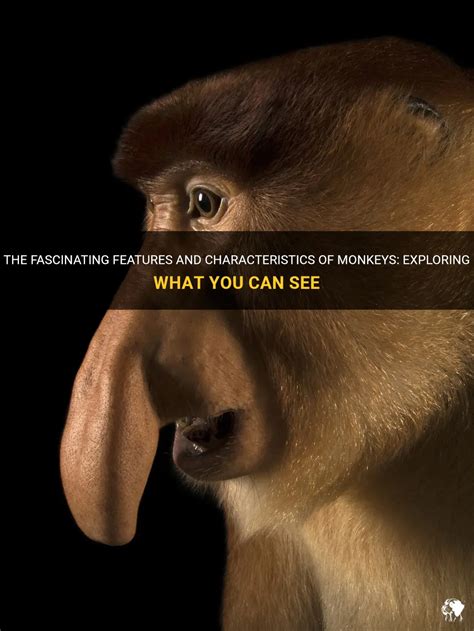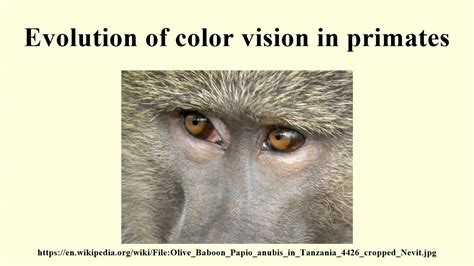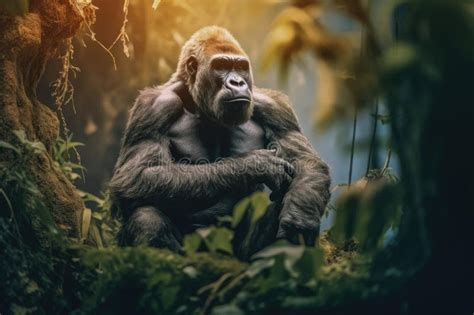Have you ever found yourself immersed in the curious realm of slumber, only to be greeted by a vivid vision of an audacious and assertive creature? This enigmatic being, oftentimes bearing a resemblance to a lively simian, has perplexed the human mind for centuries. While dreams possess a mystical allure, it is in the presence of a spirited and assertive monkey that our imagination truly soars. In this exploration, we embark on a journey to dissect and comprehend the symbolic implications hidden within the realm of somnolent encounters with this remarkable primate.
Encountering this remarkable creature in the ethereal landscape of dreams invites us into a realm where our subconscious intertwines with symbolism. This vivacious entity, with its fierce and resolute demeanor, captivates our attention and fuels our curiosity. The symbolic representation of this bold primate stirs a range of emotions within us, from awe and admiration to apprehension and intrigue. As we unravel the significance behind the monkey's presence in our dreams, we unearth a rich tapestry of hidden meanings that have the power to illuminate our deepest desires, fears, and aspirations.
Within the intricate web of symbolism, the tenacious and audacious monkey emerges as a guiding force, imparting profound insights into our psyche. In the realm of dream interpretation, it is crucial to delve beyond the surface level and unearth the connotations attached to this feisty primate. Beyond its mere representation as a creature of the wild, the monkey embodies a multitude of qualities that mirror our own human experiences. Its vivacity and agility translate into an expression of our inner spirit, urging us to embrace our own power and perseverance in the face of adversity.
The symbolism of the monkey extends beyond its exuberant nature; it also delves into the realms of intelligence, curiosity, and playfulness. As we decipher the messages embedded within our dreams, we begin to understand the profound connection between the monkey's presence and our own intellectual and emotional growth. By embracing the monkey's inquisitive spirit, we find ourselves propelled into a world of endless possibilities, where creativity flourishes and new avenues of exploration open up before us. This intrepid primate serves as a reminder to nurture our inner child, to embrace spontaneity, and to approach life's challenges with a playful and resilient attitude.
The Significance of Monkeys in Dreams

In the realm of dreams, primates wield profound symbolism that transcends their mere presence. Monkeys, with their curious and agile nature, often embody a plethora of meanings in the dream world. These enigmatic creatures are known for their playful antics, intelligence, and ability to mimic human behavior. As such, they serve as powerful symbols that reflect various aspects of our own lives and personalities.
Curiosity and Adaptability: Monkeys, in dreams, frequently represent our inherent curiosity and adaptability. They encourage us to explore new possibilities, embrace change, and break free from stagnant routines. By observing their agile movements, we are reminded of the importance of being open-minded and receptive to the ever-changing circumstances of life.
Playfulness and Chatter: The mischievous nature of monkeys often signifies the need for lightheartedness and joy in our lives. Dreams featuring monkeys may be a gentle reminder to take a break from our serious pursuits and engage in playful activities. Moreover, the chattering of monkeys can symbolize communication and sociability, urging us to connect with others and build harmonious relationships.
Imitation and Reflection: Monkeys are notorious imitators, mirroring both our positive and negative qualities. Dreams featuring monkeys may indicate the need for self-reflection and self-awareness. They prompt us to evaluate our own behavior and determine whether we are imitating healthy or detrimental habits and attitudes. By embracing the monkey's ability to imitate, we gain insights into our own actions and can make positive changes accordingly.
Wisdom and Intelligence: Monkeys are hailed for their intelligence and problem-solving abilities. In the realm of dreams, they may symbolize the need to tap into our own intellectual capacity and wisdom. They encourage us to think critically, solve problems creatively, and seek innovative solutions. By awakening our inner monkey, we can unlock untapped potential and make empowered choices in our waking lives.
In conclusion, dreams featuring monkeys hold a rich tapestry of symbolism. Their portrayal in the dream world encompasses notions of curiosity, playfulness, imitation, and wisdom. By unraveling the deeper meaning behind these dreams, we can gain valuable insights into ourselves and embark upon a journey of self-discovery and personal growth.
The Significance of Aggression in the Analysis of Dreams
Exploring the intricate workings of dream psychology involves delving into the interpretation of various emotions and behaviors experienced during sleep. One such emotion that holds great importance in this analysis is aggression. Understanding the significance of aggression in dreams can provide valuable insights into the subconscious mind, unveiling hidden desires, conflicts, and unresolved issues.
Aggression, often characterized by hostility, anger, and assertiveness, is a primal instinct deeply rooted within human nature. When it manifests itself in the realm of dreams, it signifies a multitude of underlying meanings and implications. Dreams featuring aggression are not merely random occurrences but rather purposeful and intricate symbolic representations of one's innermost thoughts and experiences.
One interpretation of aggression in dream psychology suggests that it can symbolize repressed anger or frustration that the dreamer is unwilling or unable to express in their waking life. These dreams may serve as an outlet for individuals to release suppressed emotions, offering a cathartic experience that helps maintain emotional well-being.
Additionally, aggression in dreams can also be indicative of a need for assertiveness or standing up for oneself. It may be a reflection of an individual's desire to confront and overcome difficulties or obstacles they are currently facing in their waking life.
It is important to note that the interpretation of aggression in dreams is not a one-size-fits-all approach. Every individual's dream experiences are unique, and personal contexts must be taken into account. Factors such as cultural background, personal history, and individual psychology contribute to the overall significance of aggression in dream analysis.
By unraveling the hidden meanings behind aggression in dreams, individuals can gain a deeper understanding of their emotions, motivations, and unresolved conflicts. This self-awareness enables personal growth, leading to enhanced self-empowerment and a better understanding of one's mental and emotional well-being.
Exploring the Characteristics of Monkeys in Indigenous Folklore

Delving into the realm of indigenous folklore, we embark on an intriguing journey to uncover the fascinating traits and qualities assigned to monkeys in various cultural narratives. Within these rich tales and legends, monkeys are often portrayed as remarkable creatures, embodying a myriad of virtues, strengths, and peculiarities.
Resourcefulness: Monkeys are often revered for their innate ability to quickly adapt and find innovative solutions in the face of challenges. They epitomize resourcefulness, utilizing their dexterous limbs and sharp intellect to surmount obstacles that come their way.
Cleverness: Indigenous folklore frequently paints monkeys as cunning tricksters, employing their intelligence and stratagem to outwit others. Their shrewdness and astuteness are renowned, making them prominent characters in tales that revolve around cunning and deception.
Playfulness: Monkeys are known for their exuberant and spirited nature, symbolizing the joy and playfulness that permeate indigenous folklore. Their animated antics and mischievous behavior often bring laughter and mirth to the narratives, becoming beloved companions of heroes and heroines.
Curiosity: In ancient tales, monkeys are often portrayed as curious creatures, driven by an insatiable thirst for knowledge and exploration. Their inquisitive nature compels them to venture into unknown territories, uncovering hidden secrets and stirring the imagination of storytellers.
Community: Monkeys have also come to represent the importance of unity and cooperation within indigenous folklore. Their social nature and ability to thrive in groups serve as a reminder of the strength that lies in communal bonds and the value of collective endeavors.
As we immerse ourselves in the captivating narratives of indigenous folklore, the diverse characteristics assigned to monkeys unfold before us, offering invaluable insights into the cultures and beliefs of various communities. Exploring the multifaceted nature of these enchanting creatures enriches our understanding of the intricate tapestry of human imagination and storytelling traditions.
The Impact of Cultural Beliefs on Interpreting Dreams
Cultural beliefs play a significant role in how dreams are perceived and interpreted. The diverse range of cultures around the world brings forth unique perspectives and understandings when it comes to the symbolic meanings embedded within dreams. These deeply rooted cultural beliefs shape the way individuals interpret and assign significance to their dreams, oftentimes leading to varying interpretations even for similar dream symbols.
Cultural beliefs heavily influence the lens through which dreams are viewed. For instance, in some cultures, dreams are believed to be messages from the spiritual realm or higher powers. In such societies, dreams are seen as a means of communicating with ancestors or receiving guidance from divine entities. On the other hand, cultures that place a strong emphasis on scientific rationalism may view dreams as mere random firings of the brain during sleep, devoid of any deeper meaning.
Moreover, cultural beliefs can determine the significance attributed to specific dream symbols. For instance, in one culture, dreaming of a snake may be viewed as a sign of impending danger or treachery, while in another culture, it may symbolize wisdom and healing. Similarly, the interpretation of animal symbols in dreams can also vary greatly depending on cultural context. A monkey, for example, might be associated with playfulness and curiosity in one culture, while in another, it may be seen as a representation of deceit or mischief.
The impact of cultural beliefs on dream interpretation highlights the importance of understanding the cultural context within which dreams are experienced. A dream that may seem absurd or insignificant in one culture could hold deep meaning and significance in another. Recognizing and respecting these diverse perspectives can lead to a richer understanding of dreams and their potential interpretations.
Analyzing the Jungian Perspective on Primate Visions

Exploring the depths of the human subconscious is an enigma as intricate as the hidden symbolism within dreams themselves. In this section, we delve into the fascinating theories proposed by renowned psychologist Carl Jung, as we seek to unravel the layers of interpretation behind dreams featuring powerful and assertive primates.
Jungian psychology emphasizes the importance of collective symbols and archetypes that are embedded in the human psyche. The archetypal figure of the monkey, with its inherent agility and intelligence, represents a complex web of meanings that can be deciphered through dream analysis. By delving into the rich realms of the unconscious, we aim to shed light on the potential underlying messages conveyed by these primate manifestations in dreams.
- 1. The Trickster Archetype: Within Jungian psychology, the monkey is often associated with the archetype of the trickster. This mischievous figure embodies playful disruption and the breaking of societal norms, encouraging individuals to question the established order. By exploring the presence of the trickster archetype within monkey dreams, we can gain insights into the potential need for rebellion and psychological growth in the dreamer's life.
- 2. Symbolic Communication: Monkeys are highly social creatures that rely heavily on intricate forms of communication. In the context of dreams, their presence can be indicative of the dreamer's desire for increased social connections or the need for improved communication skills. By interpreting the symbolism of these primate encounters, we can uncover hidden messages related to the dreamer's interpersonal relationships.
- 3. Shadow Integration: Jungian psychology highlights the significance of integrating one's shadow, which encompasses repressed and unacknowledged aspects of the self. Monkeys, with their unruly and impulsive nature, can serve as a representation of these shadow aspects. By analyzing the encounters with aggressive monkeys in dreams, we can discern the potential need for the dreamer to confront and integrate their shadow, leading to personal growth and wholeness.
- 4. Personal and Collective Unconscious: The symbolism of monkeys in dreams can also allude to the collective unconscious, a shared reservoir of human experiences, symbols, and archetypes. By interpreting the individual's personal experiences and cultural contexts, we can unravel the deeply ingrained meanings associated with the presence of monkeys in dreams, shedding light on the influence of the collective unconscious on personal psyche.
By exploring the Jungian perspective on monkey dreams, we embark on a transformative journey of self-discovery and psychological introspection. Through the decoding of these primate encounters, we unearth valuable insights into the complexities of the human psyche and the subconscious desires that drive our dreams.
Unconscious Longings and Repressed Sentiments Evident in Primate Reveries
Within the depths of one's slumber lies a profound realm where the human psyche releases its inhibitions and surrenders to the unrestrained flow of desires and emotions. Simian visions that permeate this nocturnal landscape offer a unique insight into the unconscious longings and repressed sentiments of individuals. By examining the symbolic representation of monkeys in dreams, one can unravel a complex tapestry of hidden desires and suppressed emotions.
The enigmatic presence of our primate counterparts in the realm of dreams serves as a reflection of our innermost yearnings and unexplored realms of the psyche. Monkeys, revered as creatures of intelligence and cunning, embody qualities typically associated with playfulness, curiosity, and mischief, while also encompassing antagonizing traits like aggression and domination. Inherent in these characteristics lies a symbolic manifestation of desires that are often buried in the recesses of our minds.
In the vast spectrum of human experiences, we encounter numerous instances where our desires remain obscured due to societal norms, personal inhibitions, or subconscious fears. Dreams, acting as a conduit between the conscious and unconscious mind, provide an avenue for the exploration of these hidden desires. The presence of monkeys in these dreams unveils an array of repressed emotions, allowing individuals to confront and make sense of their unexpressed longings.
The dreamscape inhabited by monkeys serves as a metaphorical playground, where the boundaries of reality dissipate, giving way to the raw and unfiltered expressions of the human psyche. As revered symbols of primal instincts and untamed impulses, monkeys in dreams beckon individuals to embrace their own instincts, unleash their suppressed desires, and reconcile with aspects of themselves that have been long neglected.
Through a comprehensive analysis of monkey dreams, it is possible to decode the intricate symbolism and unravel the deeply rooted psychological imprints that shape our waking reality. By acknowledging the existence of unconscious desires and repressed emotions, individuals can embark on a journey of self-discovery and personal growth, ultimately leading to a more fulfilled and authentic existence.
Decoding the Significance of Fear and Dominance in Dreams featuring a Powerful Primate

When analyzing dreams depicting encounters with a formidable primate, the significance lies in understanding the intricate dynamics of fear and dominance that manifest within the subconscious realm. These dreams offer a compelling glimpse into the psychology of power struggles, as well as the primal instincts that drive our behavior.
In these dreams, the presence of a commanding primate symbolizes an external force or influence that triggers feelings of unease and trepidation. The fear associated with encountering such a creature is not merely rooted in its physical prowess, but also in the power it represents. These dreams often serve as a mirror to our own fears and anxieties surrounding authority and control.
- Exploring the symbolism of fear: In this section, we delve into the various interpretations of fear within dreams featuring a dominant primate, examining its possible origins and underlying meanings.
- The dynamics of dominance: Here, we explore the complex interplay of power dynamics showcased in these dreams, shedding light on the subconscious struggle for dominance and control.
- Unraveling the primal instincts: This segment investigates the primal instincts and innate fears associated with encounters with a fierce primate in dreams, drawing parallels with our own primal nature.
- The influence of external factors: Within this section, we explore the potential impact of external influences on dreams featuring a powerful primate, such as societal norms, personal experiences, or cultural symbolism.
- Facing fears and embracing empowerment: Concluding this article, we discuss strategies for interpreting and overcoming the fear depicted in dreams of a formidable monkey, providing insights into personal growth and empowerment.
By unraveling the complex symbolism and analyzing the fear and power dynamics represented in dreams that feature a fierce and aggressive primate, we gain a deeper understanding of our own fears, desires for control, and the primal aspects of our human psyche.
FAQ
What does it mean if I dream of a fierce and aggressive monkey?
Dreams are highly subjective and can have multiple interpretations. However, dreaming of a fierce and aggressive monkey may symbolize unresolved conflicts or aggressive tendencies within yourself. It could also represent feeling threatened or overwhelmed in certain situations in your waking life.
Are there any cultural or symbolic meanings associated with monkeys in dreams?
Yes, monkeys hold various cultural and symbolic meanings in different societies. In some cultures, monkeys are seen as tricksters or mischievous creatures that symbolize playfulness and curiosity. In other cultures, monkeys can represent intelligence, adaptability, or even be associated with deities. However, the interpretation of monkey dreams heavily depends on an individual's personal associations and experiences.
Can dreaming of a fierce and aggressive monkey suggest a need for assertiveness in my waking life?
It is possible. Dreaming of a fierce and aggressive monkey might be your subconscious mind's way of conveying a message about the need to be more assertive or stand up for yourself in certain situations. It could be an indication that you need to confront your fears or address conflicts directly rather than avoiding them.
Is it common to dream about monkeys?
Dreaming about monkeys is relatively common as they are familiar animals that evoke a range of emotions and associations. However, the frequency of such dreams can vary among individuals, and the significance of the dream would be highly specific to the dreamer's personal experiences, emotions, and cultural background.



